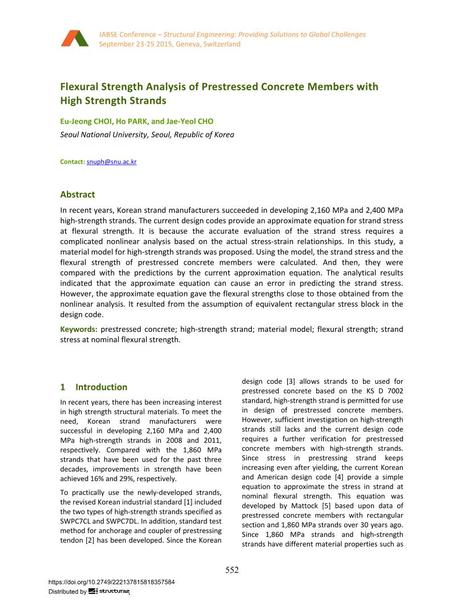Flexural Strength Analysis of Prestressed Concrete Members with High Strength Strands

|
|
|||||||||||
Détails bibliographiques
| Auteur(s): |
Eu-Jeong Choi
(Seoul National University, Seoul, Republic of Korea)
Ho Park (Seoul National University, Seoul, Republic of Korea) Jae-Yeol Cho (Seoul National University, Seoul, Republic of Korea) |
||||
|---|---|---|---|---|---|
| Médium: | papier de conférence | ||||
| Langue(s): | anglais | ||||
| Conférence: | IABSE Conference: Structural Engineering: Providing Solutions to Global Challenges, Geneva, Switzerland, September 2015 | ||||
| Publié dans: | IABSE Conference Geneva 2015 | ||||
|
|||||
| Page(s): | 552-558 | ||||
| Nombre total de pages (du PDF): | 7 | ||||
| Année: | 2015 | ||||
| DOI: | 10.2749/222137815818357584 | ||||
| Abstrait: |
In recent years, Korean strand manufacturers succeeded in developing 2,160 MPa and 2,400 MPa high-strength strands. The current design codes provide an approximate equation for strand stress at flexural strength. It is because the accurate evaluation of the strand stress requires a complicated nonlinear analysis based on the actual stress-strain relationships. In this study, a material model for high-strength strands was proposed. Using the model, the strand stress and the flexural strength of prestressed concrete members were calculated. And then, they were compared with the predictions by the current approximation equation. The analytical results indicated that the approximate equation can cause an error in predicting the strand stress. However, the approximate equation gave the flexural strengths close to those obtained from the nonlinear analysis. It resulted from the assumption of equivalent rectangular stress block in the design code. |
||||
